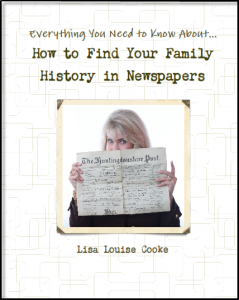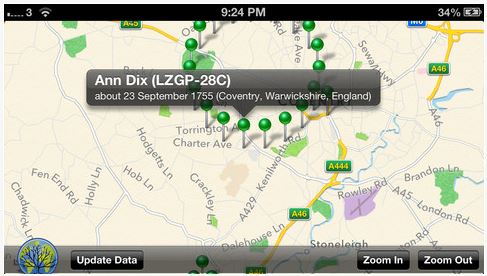by Lisa Cooke | Aug 15, 2013 | 01 What's New, Newspaper
Have you already searched for your relatives’ names at Chronicling America, the the Library of Congress’ web collection of digitized American newspapers? Well, search again!
Recently the the Library of Congress added more than 600,000 historic newspaper pages to its enormous collection. According to a press release, these pages include “first-time contributions from Iowa, Michigan, and West Virginia. Other new additions include content from Hawaii, Indiana, Illinois, Kansas, Kentucky, Louisiana, Minnesota, Montana, North Dakota, Oklahoma, Oregon, South Carolina, Tennessee, and Texas.” The site now has over 6.6 million searchable newspaper pages from over 1100 newspaper titles, published in 30 states and Washington, D.C. between 1836 and 1922.
 What are the chances your family will appear on one of those pages? Pretty good, actually. Here’s a list of the kinds of articles they may show up in from my book How to Find Your Family History in Newspapers:
What are the chances your family will appear on one of those pages? Pretty good, actually. Here’s a list of the kinds of articles they may show up in from my book How to Find Your Family History in Newspapers:
- Advertising: classifieds, companies your ancestor worked for or owned, grocery or dry goods stores ads (for historical context), runaway slaves search and reward, ship departures.
- Births & deaths: birth announcements, card of thanks printed by the family, obituary and death notices, “Community Pioneer” article upon passing, funeral notice, reporting of the event that lead to the death, or the funeral.
- Legal notices and public announcements: auctions, bankruptcies, city council meetings, divorce filings, estate sales, executions and punishments, lawsuits, marriage licenses, probate notices tax seizures, sheriff’s sale lists.
- Lists: disaster victims, hotel registrations, juror’s and judicial reporting, letters left in the post office, military lists, newly naturalized citizens, passenger lists (immigrants and travelers), unclaimed mail notices.
- News articles: accidents, fires, etc. featuring your ancestor; front page (for the big picture); industry news (related to occupations); natural disasters in the area; shipping news; social history articles.
- Community and social events like school graduations, honor rolls, sporting and theater events; social news like anniversaries, church events, clubs, engagements, family reunions, visiting relatives, parties, travel, gossip columns, illnesses, weddings and marriage announcements.
Learn more about researching family history with my book, available in both print and e-book format. And don’t forget to keep checking Chronicling America for stories and clues about your ancestors’ lives.
by Lisa Cooke | Jul 30, 2013 | 01 What's New, History, Inspiration, Who Do You Think You Are?

Genealogy Roadshow logo
Lovers of Who Do You Think You Are! and other genealogy TV favorites will be pleased to know that Genealogy Roadshow is filming for airing this fall on PBS.
This clever show follows a format similar to the popular Antiques Roadshow, in which antiques experts travel to various cities to talk about artifacts brought in by area residents. Residents may lug in tall grandfather clocks, faded letters or other old objects. Experts comment on the historical context, rarity and value of their artifacts. Viewers enjoy watching owners who become overjoyed, stunned, fascinated and occasionally disappointed by what the experts say.
Genealogy Roadshow spins that format in a family history direction. PBS describes it this way: “Participants want to explore unverified genealogical claims passed down through family history, that may (or may not) connect them to an event or a historical figure. Experts in genealogy, history and DNA will use family heirlooms, letters, pictures, historical documents and other clues to hunt down more information. These experts will enlist the help of local historians to add color and context to the investigations, ensuring every artifact and every name becomes a clue in solving the mystery.”
This season, hosts are Kenyatta Barry and D. Joshua Taylor, young but expert and enthusiastic voices in the American genealogy community. The cities hosting Genealogy Roadshow are Nashville, Austin, Detroit and San Francisco. PBS explains that “these cities were chosen as American crossroads of culture, diversity, industry and history, with deep pools of potential participants and stories.”
This has already been a popular series in Ireland, where Genealogy Roadshow is in its second season. The series premieres in the U.S. on KQED on Monday September 23.
by | Jul 22, 2013 | 01 What's New, British
The London Metropolitan Archives says that half the inquiries they receive are from family historians. This is likely due to their rich resources (click here to peruse the collections)
Because there is such a strong genealogy interest in the LMA, they are making a huge effort to reach out to genealogists. They’re all about educating us and sharing what’s at LMA through their website, hands-on classes, remote research services and partnerships with data sites like Ancestry.co.uk and FindMyPast.co.uk. All this from a city archive!
Check out this video they’ve made for family history researchers:
Doesn’t that video make you want to check out the LMA for yourself? On their website, click on Family History. Read up on the basics, then click on Information Leaflet No.1 for a detailed description of their holdings. If you can’t visit, you can use their Family History Research Service. But it looks like a pretty tempting research destination!
by Lisa Cooke | May 21, 2013 | 01 What's New, FamilySearch, Inspiration, iPad, Maps, Technology
A new app for FamilySearch.org users lets you map your ancestors’ birthplaces. It retrieves information about your ancestors from your data at FamilySearch.org. It’s called Family Map and it looks like this:

Family Map app for FamilySearch.org users.
While there are lots of maps online, it’s fun to see your relatives all mapped at once (with no extra effort from yourself). This tool is especially great for sharing your family history with relatives. They can see at a glance your family migration patterns, remark on the number of people who stayed in the old hometown (or didn’t) and put themselves in context.
Thanks to Devin Ashby at FamilySearch for tipping me off to this app. The app is FamilyMap – Scoutic and is available
on iTunes for $1.99.
 What are the chances your family will appear on one of those pages? Pretty good, actually. Here’s a list of the kinds of articles they may show up in from my book How to Find Your Family History in Newspapers:
What are the chances your family will appear on one of those pages? Pretty good, actually. Here’s a list of the kinds of articles they may show up in from my book How to Find Your Family History in Newspapers:

